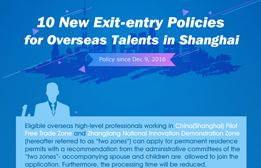Shanghai set to lead talent development
All-around talent cultivation
Shanghai is at a critical stage of promoting high-quality development and has issued more open and convenient talent introduction policies.
Shanghai is in the midst of attracting high-level talents in the fields of AI, biomedicine and integrated circuits. At the same time, it has launched programs such as the Pujiang Talent Program and the Super Postdoctoral Program to introduce young outstanding professionals.
Jiang Xuefeng, a chemist born in the 1980s who participated in the development of antiviral drugs, is one such talent. After completing his postdoctoral research abroad, he chose to return to Shanghai and was selected as a participant in the Shanghai Pujiang Talent Program. After working at East China Normal University for more than three years, Jiang was then selected to participate in the Rising Star Program, which aims to cultivate outstanding young scientific and technological talents.
Other key approaches to Shanghai's talent introduction include appointing internationally renowned scientists and entrepreneurs as talent ambassadors and making good use of platforms such as the World Laureates Forum, the Shanghai Global Talents Innovation and Entrepreneurship Summit, the China International Import Expo, the Pujiang Innovation Forum and the World Artificial Intelligence Conference.
At the second Shanghai Global Talents Innovation and Entrepreneurship Summit in 2022, relevant departments invited Michael Levitt, 2013 Nobel Laureate in Chemistry, academician of National Academy of Sciences, the United States, and honorary dean of the Multiscale Research Institute for Complex Systems Science at Fudan University, as well as other influential top talents such as Chen Saijuan, He Jifeng, Yao Qizhi, Pu Muming, Zhao Dongyuan, Chen Jie and Huang Xiaoqing.
Shanghai is also nurturing local talents and creating fertile ground for their growth and development.
The city is focusing on the training of young talents in basic research and supports approximately 5,000 outstanding young sci-tech talents each year.
Specifically, Shanghai has provided an annual living allowance of 150,000 yuan ($20,610.49) for postdoctoral researchers under the age of 36 for two consecutive years, while the Zhangjiang Hi-Tech Park has launched a special pilot project for the reform of master's and doctoral degrees in engineering. This project has already recruited more than 200 master's and doctoral students over the past two years.
Recently, the National Technology Innovation Center par Excellence in Zhangjiang was designated as the "National Excellent Engineer Innovation Research Institute (Shanghai)". The plan is to construct an industry-based talent cultivation platform that integrates practical teaching, scientific research, result transformation, and innovation and entrepreneurship. It will also nurture high-level industrial innovation talents with research and innovation capabilities and practical skills.
Shanghai adheres to talent aggregation and has gathered a group of world-class teams engaged in basic frontier fields and core technologies by taking advantage of major scientific platforms such as the Shanghai Synchrotron Radiation Facility, the Shanghai Superintense Ultrafast Laser Facility, soft x-ray and the National Center for Protein Science.
For example, the Shanghai Synchrotron Radiation Facility has attracted nearly 30,000 scientists from around the world and published nearly 7,000 papers.
Shanghai supports scientists to initiate and participate in major projects and has been accelerating the construction of three industrial highlands: integrated circuits, biomedicine and AI. The city has constructed more than 100 national-level industrial innovation platforms related to industrial chains.
There are nearly 50 global top enterprises and more than 1,600 corporate technology innovation centers. The city has cultivated a number of well-known high-tech companies and formed an innovative alliance with the support of universities and research institutes.
Shanghai is also building various national platforms, industrial parks, science parks and a system of technology, finance and intellectual property to provide low-cost, convenient and comprehensive services for talents and teams.
Currently, there are more than 600 incubators that have nurtured about 24,000 companies in Shanghai.

 Print
Print Mail
Mail




